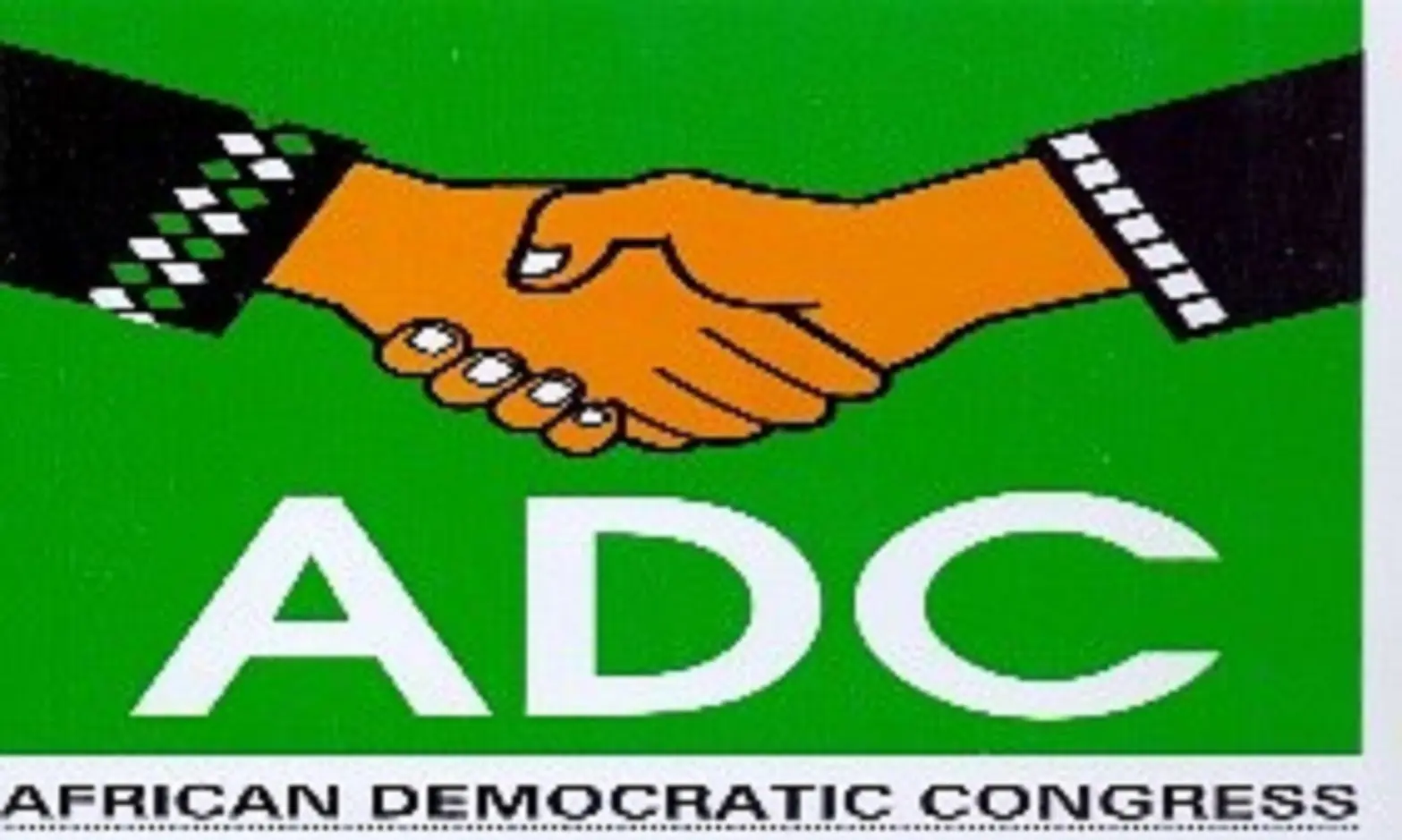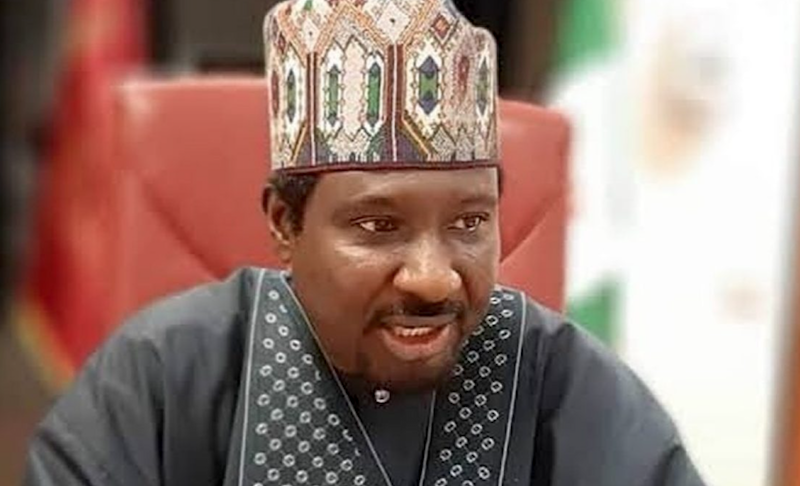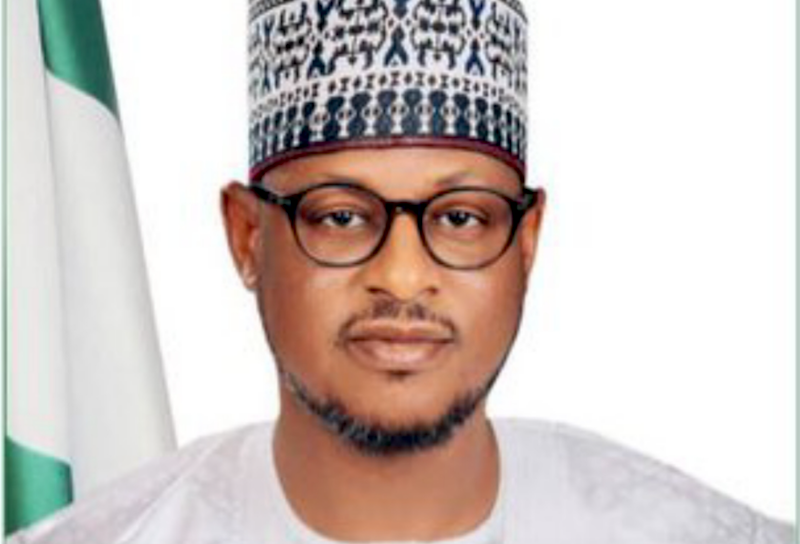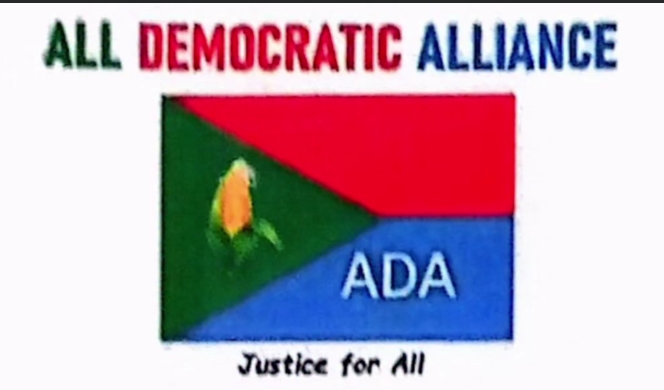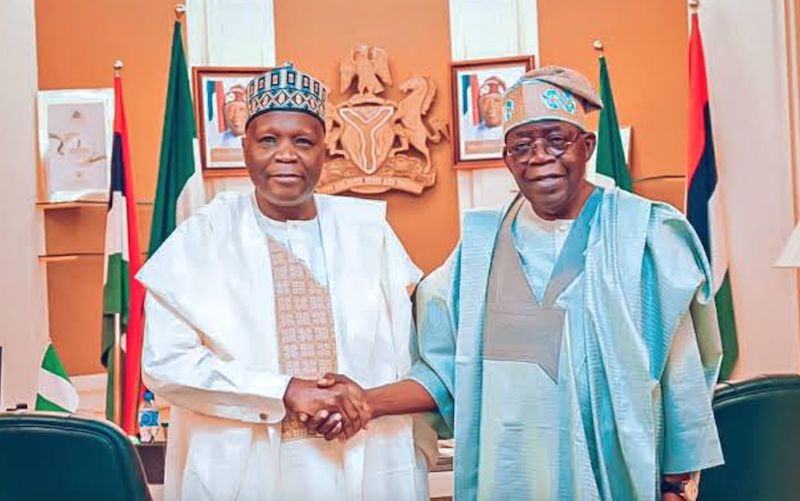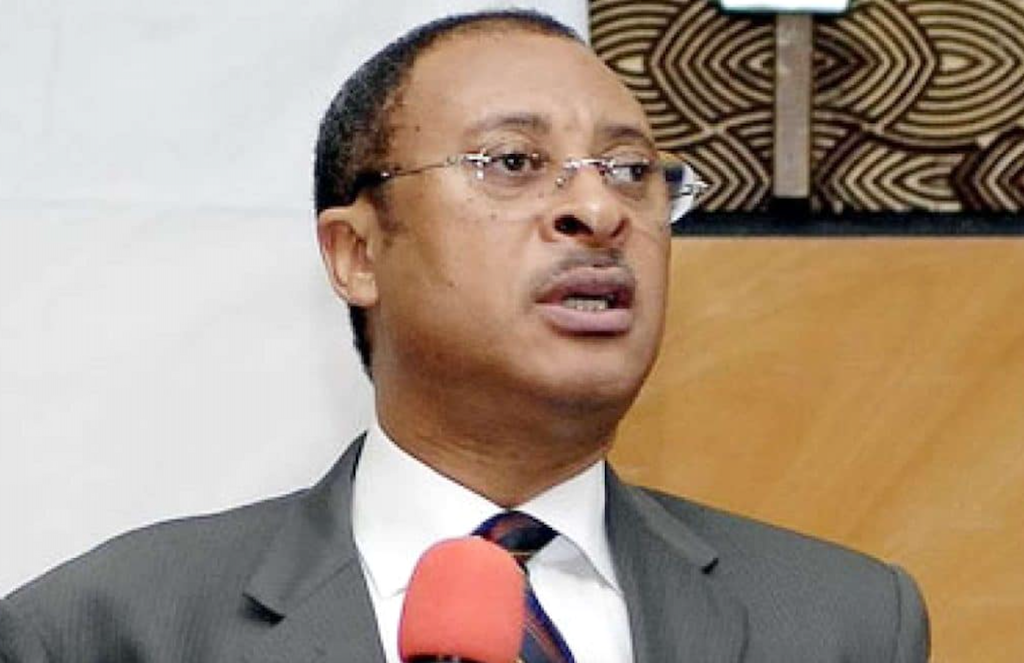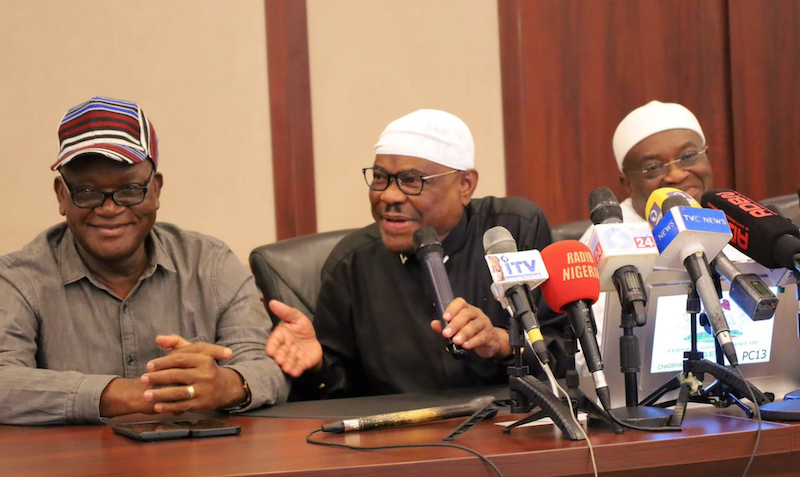The African Democratic Alliance (ADA), the name of the new political party currently seeking registration with the Independent National Electoral Commission (INEC)—Nigeria’s electoral umpire—is a platform being floated by a group of top-tier politicians who are presently aggrieved. Their dissatisfaction stems from no longer occupying front-row seats in Nigeria’s political leadership or enjoying unfettered access to the Aso Rock Villa, the seat of presidential power.
According to media reports, the prominent figures behind this new political vehicle include:
1. Former Vice President of Nigeria (1999–2007) and presidential candidate of the former ruling party, Waziri Adamawa, Atiku Abubakar
2. Former President of the 8th Senate and ex-Governor of Kwara State, Bukola Saraki
3. President of the 6th Senate and military governor of Niger State during the Gen. Ibrahim Babangida regime, David Mark
4. Former Minister of the Federal Capital Territory (FCT) and immediate past Governor of Kaduna State, Nasir El-Rufai
5. Former Governor of Rivers State and immediate past Minister of Transportation, Rotimi Amaechi
6. Former Governor of Anambra State, 2019 PDP vice-presidential candidate, and 2023 Labour Party, LP presidential flag bearer, Mr. Peter Obi
7. Babachir Lawal, former Secretary to the Government of the Federation under President Muhammadu Buhari
The list is by no means exhaustive. Others, such as former President Goodluck Jonathan, appear to be operating behind the scenes. Nonetheless, it is not an exaggeration to describe these eight figures as first-class politicians.
When l heard in the broadcast media and read in the press the list of the political actors aiming to displace President Tinubu in 2027, what resonated in my mind is the hit song by the American singer, Tina Turner: What’s Love But a Second-hand Emotion?
It is being in sync with Tina Turner’s assessment of love, that l dare to classify the promoters of the proposed political platform, ADA as brand new second-hand politicians angling to replace President Tinubu in Aso Rock villa in 2027. For instance, how can El-Rufai, an ardent proponent of Muslim- Muslim presidential ticket be working with Babachir Lawal who is a die-hard opponent of El-Rufai’s ideology and promoter of Christian -Muslim or vice versa presidency to set up together a new political platform? Notably, it was Babachir who parted ways with Tinubu when he settled for a Muslim- Muslim ticket.
But the balanced manner in which President Tinubu has so far managed the often magnified differences between muslims and Christians in Nigeria that has revealed how absurd politics can be in Nigeria and a validation of the fact that it is the elite that play up tribal and religious sentiments by emphasizing or exploiting religious differences in Nigeria to the detriment of the unity, harmony and inclusiveness in our country that should drive the greater good and prosperity of all Nigerians.
Over the 26 years since Nigeria’s return to multi-party democracy, these individuals that l would like to refer to as first-class politicians playing second-hand politics earlier listed have occupied commanding positions within the political landscape. Their experiences span the executive arm—from vice presidents, ministers, and secretaries to the federal government, down to state governors. In the legislative arm, the group also includes two of the most consequential Senate presidents since 1999.
One of the most vocal actors seeking to torpedo President Bola Tinubu’s re-election bid in 2027 is Mallam Nasir El-Rufai, the immediate past Governor of Kaduna State and former Minister of the FCT. Until recently, he was a key figure within the ruling All Progressives Congress (APC). However, following the Senate’s rejection of his ministerial nomination by President Tinubu, El-Rufai defected to the Social Democratic Party (SDP).
Expressing his frustration during a recent television appearance, El-Rufai publicly apologized to Nigerians for supporting Tinubu’s rise to the presidency. He also declared that Tinubu would not secure northern votes in 2027:
“We have polled it. There is a 91 percent disapproval of this administration across the country. 91 percent disapproval is the worst in Nigeria’s history.”
His comments stand in stark contrast to those of his successor, Governor Uba Sani, and other notable political figures in the north who have dismissed El-Rufai’s assertions and the emerging anti-Tinubu coalition as “hogwash” and lacking substance.
Regardless, El-Rufai’s ‘apology’ echoes that of former military head of state and ex-president Olusegun Obasanjo, who similarly recanted his support for former Vice President Goodluck Jonathan after he succeeded the late Umaru Musa Yar’Adua as president in 2010. As may be recalled, Obasanjo also ‘apologized’ to Nigerians for backing Jonathan’s presidency.
Discomfited and disillusioned, former ally of President Bola Tinubu, Nasir El-Rufai, concluded his scathing commentary on Tinubu’s administration—an administration he helped midwife—with the following declaration:
“Let me contribute towards removing this evil that I believe will destroy Nigeria if left unchecked.”
In playing a familiar political script, El-Rufai appears to be walking the path previously trodden by former President Olusegun Obasanjo, whose political about-face has become a hallmark of Nigeria’s democracy. What this reveals is a pattern: first-class politicians engaging in second-hand politics.
A prime example is Obasanjo’s turn against Goodluck Jonathan, a man he had backed for president after the death of President Umaru Yar’Adua in 2010. Fueled by resentment, Obasanjo aligned with his former military colleague and fellow Head of State, General Muhammadu Buhari, to ensure Jonathan’s defeat in the 2015 elections. He joined the “Never Jonathan” movement—dominated by northern political actors who believed that Jonathan had usurped their rightful turn under Nigeria’s informal rotation agreement, a gentlemen’s pact respected by political elites.
Jonathan’s failure to step aside after completing Yar’Adua’s term triggered a backlash. His perceived breach of the zoning formula—though unwritten—galvanized opposition. Obasanjo’s dramatic withdrawal of support from Jonathan, including the infamous public tearing of his PDP membership card, sealed the latter’s fate. El-Rufai’s recent resignation from the APC—though not as theatrical—mirrors Obasanjo’s defection in both symbolism and intent. El-Rufai simply exited rather loudly and joined the lesser-known Social Democratic Party (SDP).
Adding to the narrative of recycled political strategy is Obasanjo’s eventual fallout with Buhari, whom he had also helped bring to power. When Buhari’s administration failed to serve his perceived interests, Obasanjo began funding an alternative political movement—a “third force”—made up of former aides and political allies. But it suffered a stillbirth.
Yet, despite these maneuvers, Buhari won re-election in 2019. This outcome underscores a critical truth: poor economic performance or widespread hardship does not necessarily translate to electoral defeat—especially in Africa. Even in advanced democracies, it is rarely inflation or economic stagnation alone that unseats incumbents. Instead, it is the mishandling of major crises—natural or man-made—that spells doom.
Donald Trump, for instance, lost the 2020 U.S. election largely due to the allegations that he mishandled the COVID-19 pandemic. Similarly, Jimmy Carter’s failure to navigate the Iran hostage crisis cost him re-election to Ronald Reagan in 1980. Before them, the Watergate scandal forced Richard Nixon to resign, forever altering the landscape of American politics.
Returning to Nigeria, Jonathan’s loss in 2015 was less about governance failure and more about a political agreement dishonored. The north believed it still had six years left in the rotational presidency arrangement after Yar’Adua’s death. Jonathan’s decision to contest in 2011 and again in 2015 violated that understanding.
This breach opened the door for Tinubu, then in the opposition, to build a formidable coalition—uniting five political parties into the APC, which eventually defeated the PDP. Fast forward to 2025, and a similar coalition appears to be forming under the African Democratic Alliance (ADA) to stop Tinubu in 2027. Thus, it is fair to describe this latest political effort as “second-hand politics by first-class politicians.”
But would the ADA politicians have potency of anti-jonathan movement since, denying Tinubu a second term would be an affront to southern politicians who would be aggrieved if a southerner is denied a second term in the manner that northerners felt disappointed that Jonathan stole their mandate when he allegedly usurped Yaradua’s and northern tenure in 2011 and attempted to consolidate it in 2015?
The difference this time in the structure of the opposition seemingly gathering storm, as El-Rufai pointed out during a TV interview, is that instead of a coalition of five distinct parties as in 2013, the new movement seeks to merge influential individuals from multiple political parties into a single force. The very fact that these ideologically divergent politicians are coming together underscores a longstanding Nigerian political reality: most parties are not ideologically driven, but instead serve as vehicles for individual ambition.
El-Rufai’s commentary confirms what many have long suspected—that outside a few outliers like Tinubu, who has remained in one party and is ideologically consistent, Nigeria’s political elite are driven more by self-interest than principles. Many of the politicians plotting to unseat Tinubu have switched parties two or three times. Even Obasanjo and Goodluck Jonathan, once seen as more stable figures, have at various times deployed proxies—Obasanjo backing Peter Obi in 2023 being a case in point.
It appears that the Nigerian electorate is weary of the same old politicians recycling platforms and allegiances like chameleons changing colors. Meanwhile, Tinubu has surged ahead of his rivals—not only attracting opposition heavyweights into the APC but also consolidating control across key geopolitical zones.
The defections of entire PDP structures in Delta and Akwa Ibom, and the possible vulnerability of Enugu, are just the tip of the iceberg. Tinubu has also forged strategic relationships with smaller parties like APGA (which controls Anambra) and Labour Party (ruling in Abia), parties too small to field serious presidential contenders on their own.
While the opposition still reels from APC’s aggressive expansion—bringing the number of APC-controlled states to 23 out of 36—Tinubu continues to tighten his grip. One of the boldest plays is his apparent orchestration of a leadership change in the APC, with Dr. Abdulahi Umar Ganduje stepping down as national chairman, potentially to pave the way for Dr. Rabiu Musa Kwankwaso’s entrance into the party.
Kwankwaso, a former governor of Kano State and head of the grassroots Kwankwasiyya Movement, commands immense political capital. Though he and Ganduje have been bitter rivals (Ganduje once served as Kwankwaso’s deputy in Kano State government ), reconciling them seemed elusive. But Ganduje’s resignation could mark a strategic masterstroke by Tinubu—clearing the path for Kwankwaso to bring his New Nigeria People’s Party (NNPP), which won over a million votes in Kano in the last election, into the APC.
Whether this political realignment materializes remains speculative. But based on recent developments—especially the wave of defections and high-level negotiations—Tinubu is outmaneuvering his opponents. His political dexterity is even more remarkable when compared to the PDP’s chronic inability to resolve its internal crises.
The 2023 implosion of the PDP, driven by its refusal to allow Iyorchia Ayu to step down as chairman, despite objections from the G-5 governors led by Nyesom Wike, is a case in point. That failure fractured the party and paved the way for Tinubu’s ascension to the presidency.
The G-5 (also known as the Integrity Group)—comprising Wike, Seyi Makinde, Samuel Ortom, Okezie Ikpeazu, and Ifeanyi Ugwuanyi—engaged in anti-party activity that fatally wounded Atiku Abubakar’s 2023 bid. Even in defeat, the group continues to plague the PDP, with more defections and internal hemorrhaging accelerating its decline.
Had the PDP shown half the flexibility Tinubu demonstrated in facilitating Ganduje’s exit, perhaps Ayu’s resignation could have healed the rift. But that never happened. As a result, the PDP, already in political ICU, continues its slide toward irrelevance.
Sadly, lightning has struck the PDP not once, but twice—first in 2015, and again in 2023. Meanwhile, the Labour Party, like the APC once was, now finds itself in disarray. The difference? Under Tinubu’s stewardship, the APC weathered its storms. In contrast, the PDP and LP appear rudderless.
In summary, what we’re witnessing today—a coalition of former Tinubu allies now seeking his downfall—closely mirrors past betrayals. It’s a recycled strategy, lacking in originality or ideological conviction. And that is why l have fittingly described it as:
Second-Hand Politics by First-Class Politicians
As may be recalled, in 2013, a coalition of PDP governors, known as the G7, objected to the emergence of President Goodluck Jonathan as the PDP’s presidential candidate. Much like the G5 rebellion in 2023, their opposition was rooted in the belief that Jonathan’s bid for re-election would disrupt the informal power rotation agreement between the North and South within the party. Five of those governors eventually defected to the APC under what became known as the nPDP faction, while others remained in the PDP, only to sabotage it from within—just as the G5 governors did a decade later.
Interestingly, a similar internal crisis that has effectively crippled the PDP once afflicted the APC not long after its formation under extraordinary circumstances. But to the credit of APC’s leadership, the crisis was quickly contained and never allowed to fester—certainly not to the point of causing the kind of irreparable damage that has rendered the PDP severely handicapped as a political party.
Given this history, one can justifiably conclude that Waziri Adamawa, former Vice President Atiku Abubakar, set the precedent in 2013—a precedent that Nyesom Wike and his G5 colleagues would later follow in 2023 in their own (whether by omission or commission) contribution to the gradual dismantling of the PDP.
Now, the PDP has become so toxic and dysfunctional that some of its founding members are listed among the key proponents and prospective founders of the African Democratic Alliance (ADA)—a new political platform currently under review by the Independent National Electoral Commission (INEC) among 110 pending registration applications.
Whether ADA, if approved, can succeed in its mission—as envisioned by El-Rufai and his cohort of first-class politicians playing second-hand politics—is another matter entirely.
That’s because President Tinubu seems consistently ahead of his political opponents. While others are attempting to revive the old coalition playbook by forming ADA—a haven for disenchanted ex-members of APC, PDP, LP, and other parties—Tinubu has made that model obsolete. He has done so by absorbing influential opposition figures directly into the ruling APC.
Once again, unfazed and strategic, President Tinubu appears to be outpacing his rivals, putting finishing touches on new political alliances across key voting blocs—Lagos, Kano, and Rivers—to bolster his 2027 re-election chances.
In Lagos, Tinubu’s political homestead, which he surprisingly lost in the 2023 presidential election, he has since recalibrated. The loss, attributed to Governor Babajide Sanwo-Olu’s distractions, nearly cost the governor his spot in Tinubu’s inner circle. However, following interventions by trusted allies, Sanwa-olu appears to be back in the president’s good graces and Lagos looking surely locked down for Tinubu’s re-election.
That is underscored by the reality that ebuilding voter confidence there may not be too difficult with a renewed focus from the governor.
The situation in Rivers State, however—a political powerhouse in the South—is more complicated. When President Tinubu imposed emergency measures in Rivers State earlier this year, I speculated that the decision might have been based on incomplete or distorted intelligence. Given his credentials as a democracy advocate and veteran of Nigeria’s pro-democracy struggle, a prolonged suspension of democratic governance in such a crucial state was never going to be tenable.
True to form, Tinubu—known for his ability to reverse course in response to public sentiment—is likely to rescind the six-month emergency rule in Rivers. If peace is brokered between Wike and his estranged godson, Governor Sim Fubara, it could be a political win for Tinubu, turning a moment of crisis into strategic consolidation. In such a scenario, both factions working together to support the president’s 2027 bid would be a game-changing realignment.
Whatever the terms of that reconciliation may be, the key takeaway is this: where opposition parties like PDP and LP have struggled to hold themselves together—amid defections, internal discord, and leadership failures—President Tinubu is transforming the APC into a well-oiled electoral machine. He is anchoring the party in critical voting blocs and offering a vision of hope through his Renewed Hope agenda—even as Nigerians endure the short-term pains of tough but necessary economic reforms.
The broader political landscape in Nigeria today seems to echo the wisdom of Brian Herbert, who said:
“The capacity to learn is a gift. The ability to learn is a skill. The willingness to learn is a choice.”
President Tinubu and the APC possess both the skill and the willingness to learn and evolve politically. In contrast, the PDP and LP leadership seem incapable of drawing lessons from history. The PDP, in particular, has now allowed lightning to strike twice: first in 2015, and again in 2023—both times due to self-inflicted wounds.
Meanwhile, Peter Obi, the LP’s 2023 presidential candidate, appears to be drifting into the same pattern as Atiku Abubakar: becoming a serial candidate, having been on the presidential ballot in two consecutive election cycles (2019, 2023, and now eyeing 2027) for a third attempt This redundancy, coupled with party instability, has made the LP vulnerable to the same internal disintegration that plagued the PDP.
Thus, by 2027, Nigerians may once again find themselves choosing their next president from a recycled pool—a motley crew of brand-new second-hand politicians.
Magnus Onyibe, an entrepreneur, public policy analyst, author, democracy advocate, development strategist, and alumnus of the Fletcher School of Law and Diplomacy, Tufts University, Massachusetts, USA, is a Commonwealth Institute scholar and a former commissioner in the Delta State government. He sent this piece from Dallas, Texas, USA.
